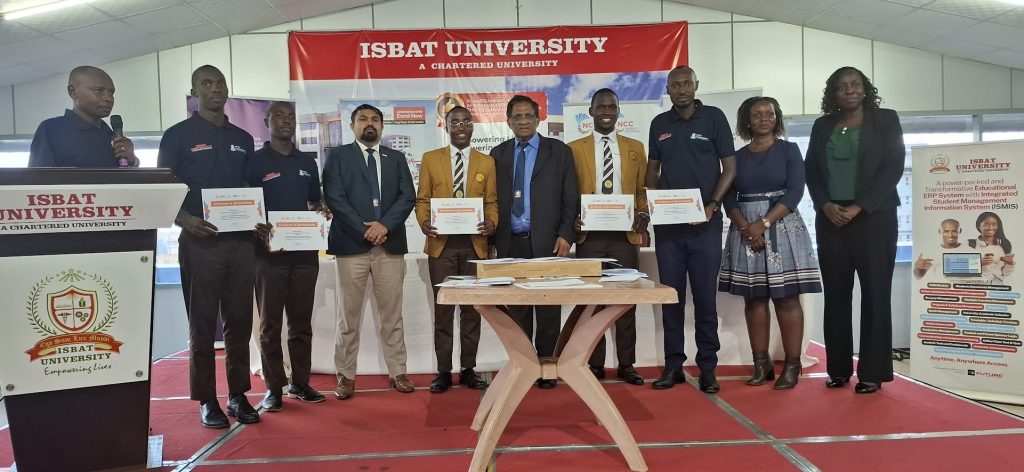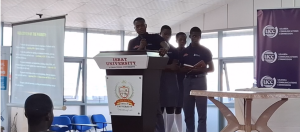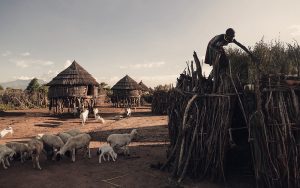St. Henry’s College Kitovu (Masaka) — Empowering Communities through Agri-Pamoja

At St. Henry’s College Kitovu (Masaka), innovation is more than a classroom exercise — it’s a call to action. Through two groundbreaking projects, Agri-Pamoja, students are redefining how technology can transform lives in Uganda’s two most vital sectors: agriculture and healthcare. Their creativity reflects not only technical skill but also a deep sense of social responsibility, showing that the next generation of Ugandan innovators is ready to solve real community challenges.
Agriculture remains the backbone of Uganda’s economy, employing more than 70% of the population and serving as the main source of livelihood for millions of families. From the rolling banana plantations of Buganda to the coffee fields of western Uganda and the maize farms of Busoga, agriculture sustains the nation.
Yet despite its importance, the sector continues to face serious challenges. Many farmers remain isolated from markets, lack access to reliable weather and price information, and depend on traditional methods that limit productivity. In addition, youth participation in agriculture is declining, as young people perceive farming as outdated, unprofitable, and disconnected from technology.
To respond to these challenges, the ICT Club of St. Henry’s College Kitovu developed Agri-Pamoja — a groundbreaking innovation that blends digital technology with agricultural development.
Introducing Agri-Pamoja: “Farming Together”
The name Agri-Pamoja, derived from Swahili meaning “Farming Together”, captures the spirit of collaboration and innovation behind the project. Conceived by the students as part of their participation in the UCC ICT Clubs initiative under KAWA Uganda, Agri-Pamoja seeks to revolutionize how farmers connect, learn, and trade.
The platform functions as a digital cooperative system, enabling farmers to join an online community where they can:
- Share real-time experiences and insights from the field.
- Access expert agricultural advice and digital extension services.
- Learn about improved farming practices and post-harvest handling.
- Connect directly to reliable markets and buyers through e-commerce tools.
By breaking the barriers of distance and information inequality, Agri-Pamoja creates a networked farming ecosystem where knowledge flows freely, and smallholder farmers can make informed decisions that improve both yield and income.
🌱 How the Platform Works
Agri-Pamoja operates as an integrated digital platform accessible through smartphones or computers. Once registered, farmers can create profiles that capture the types of crops they grow, their location, and farming goals. The system then uses this data to deliver tailored content and resources.
Key features include:
- 🌦 Weather and Market Updates: Real-time notifications on rainfall patterns, crop diseases, and market prices to help farmers plan effectively.
- 📚 Learning Hub: Video tutorials and interactive lessons on modern agricultural techniques, pest management, and climate-smart farming.
- 💬 Farmer-to-Farmer Networking: A discussion forum where users exchange ideas and support each other in tackling shared challenges.
- 🛒 Digital Marketplace: An e-commerce space for farmers to sell their produce collectively, negotiate better prices, and reduce exploitation by middlemen.
The platform’s design encourages collaboration rather than competition — ensuring that rural farmers move forward together, not in isolation.
🌾 Impact and Vision
Agri-Pamoja addresses multiple barriers in Uganda’s agricultural sector — information gaps, limited access to markets, and low adoption of modern technology. By connecting farmers digitally, the system creates a sense of community and empowerment that transcends geographical boundaries.
Through this innovation, farmers gain:
- Increased productivity through shared knowledge and smart farming methods.
- Better income through collective bargaining and market access.
- Improved resilience to climate change through access to timely, localized data.
The project aligns with two critical Sustainable Development Goals:
- SDG 2 – Zero Hunger: By improving productivity and food security.
- SDG 8 – Decent Work and Economic Growth: By creating new economic opportunities within the agricultural value chain.
In essence, Agri-Pamoja represents a bridge between traditional farming wisdom and modern digital intelligence, ensuring that technology becomes a tool for inclusion rather than exclusion.
🤝 The Power of Youth-Led Innovation
The creation of Agri-Pamoja showcases how Uganda’s young innovators are using ICT not just as a subject in school, but as a solution to national development challenges. The students at St. Henry’s College Kitovu are proving that technology can transform even the most traditional sectors like farming into vibrant, data-driven enterprises.
Through the mentorship of KAWA Uganda and the support of the Uganda Communications Commission (UCC), these students have been equipped to turn ideas into impact — demonstrating that the next generation of software developers, engineers, and entrepreneurs can be born in the classroom.
Their innovation also highlights the growing influence of the UCC ICT Clubs initiative, which continues to nurture creativity, digital skills, and community-focused innovation in schools across the country.
Building the Future: Technology Meets Agriculture
By integrating ICT into agriculture, St. Henry’s College Kitovu is leading a movement that redefines how technology can serve humanity. The Agri-Pamoja project envisions a future where:
- Every farmer has digital access to critical agricultural information.
- Youth see farming as a profitable, tech-enabled profession.
- Uganda’s agriculture evolves into a data-driven and collaborative industry.
Agri-Pamoja stands as a reminder that innovation is not confined to laboratories or corporate offices — it can begin in a school ICT lab, fueled by passion, teamwork, and the desire to make life better for communities.






